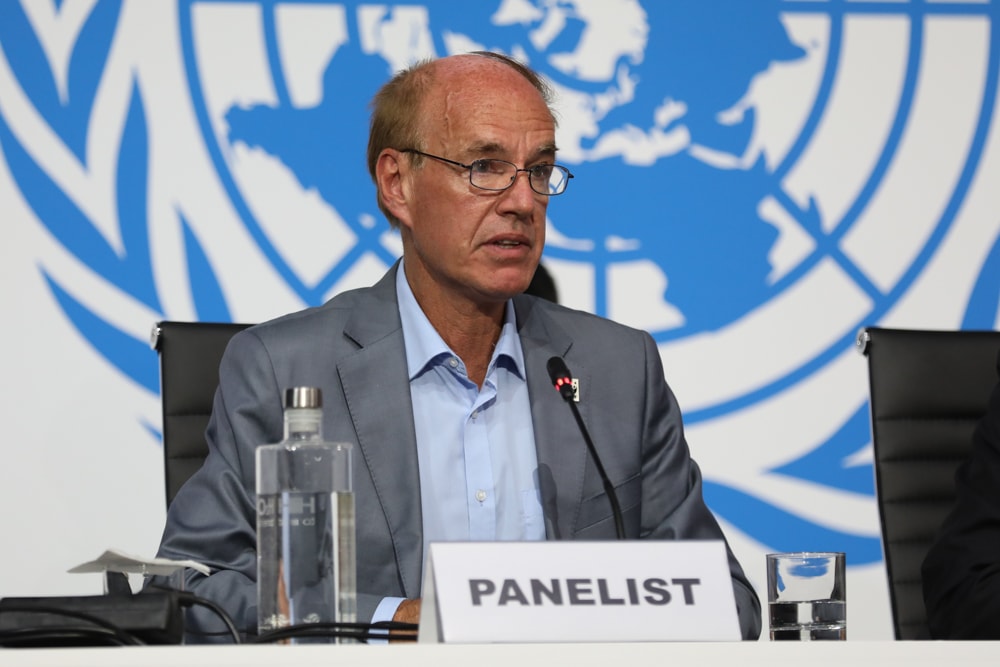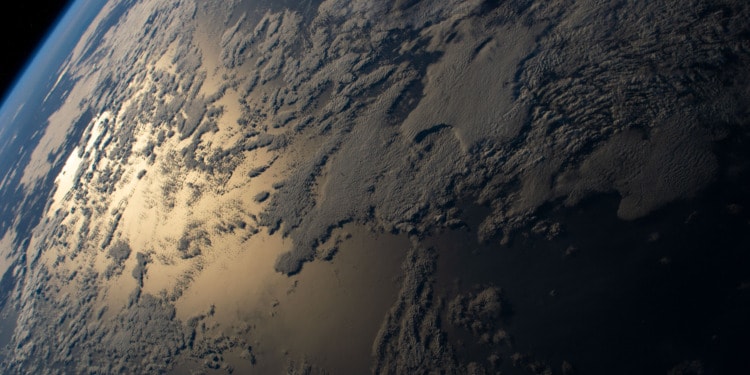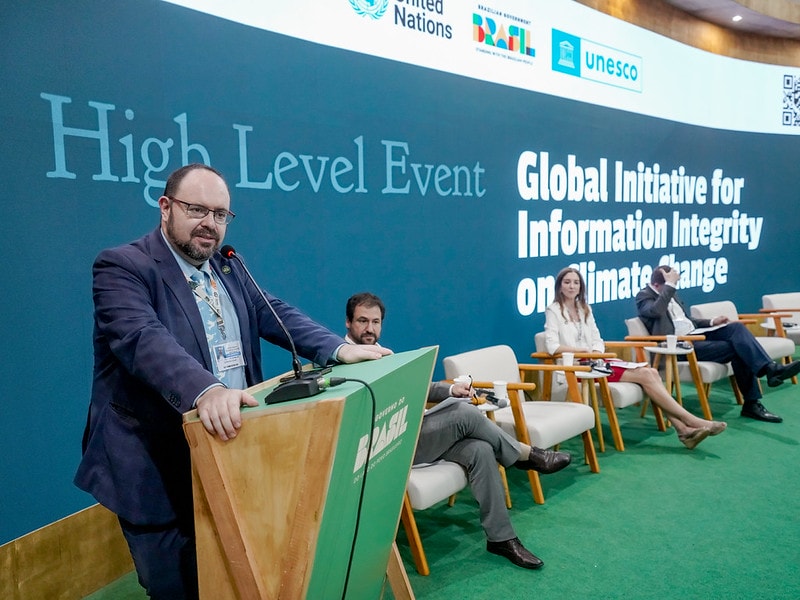Following the 2022 UN Ocean Conference in Lisbon, we spoke to World Wildlife Fund (WWF) Director-General Marco Lambertini and WWF Oceans Practice Lead Pepe Clarke to get their take on what needs to be done to address the ocean health crisis and on the role WWF and the UN Ocean Conference play in driving that change.
As WWF Director-General Marco Lambertini points out, we managed to do “tremendous damage” to our oceans that can only be solved by “eliminating pollution and overfishing and immediately start[ing] to responsibly manage and protect all marine life around the world.”
Meanwhile WWF Oceans Practice Lead Pepe Clarke, who oversees the organization’s strategy for ocean conservation efforts, reminds us that the oceans are a “powerful economic engine,” highlighting that “[c]ompanies and investors risk trillions of dollars due to declining ocean health and climate change if business as usual continues.”
To put these comments into perspective, let’s take a brief look at what oceans mean for the health of the planet and what they do for us.

The oceans, covering 70–71% of our planet and representing 99% of its living space by volume, are essential to our existence as we depend on them to regulate our climate as well as for food, water, energy, and oxygen (half of Earth’s oxygen is provided by the oceans).
They are also crucial for protecting biodiversity and, as UNEP puts it, they are our “key ally” in the fight against climate change, absorbing over 30% of the carbon dioxide caused by human activity and more than 90% of the excess heat.
Our #Ocean is a
🔹 carbon sink
🔹 source of oxygen
🔹 creator of jobs & livelihoods
🔹 provider of food & nutritionThe Ocean, is much more than a beautiful landscape to protect.
Try and look beyond what you see … pic.twitter.com/dzKO1ACUWZ
— Fisheries & Aquaculture (@FAOfish) July 8, 2022
As to their role in the global economy: over three billion people depend on the oceans for their livelihoods, with 80% of international trade taking place by sea and coastal areas accounting for around 80% of global tourism, which in some countries supports more than a third of the labor force.
At the same time, marine fisheries employ 57 million people around the world and provide the primary source of protein for over half of the least developed countries’ populations.
Damage: From overfishing to pollution and “dead zones”
The science, UNEP explains, is clear: The oceans are “seriously degraded, and if present trends continue, there will be catastrophic consequences for the planet.”
The carbon emissions that human activities have been causing since the industrial revolution, which the oceans have been absorbing all along, are now causing unprecedented levels of oxygen loss, acidification, and ocean warming, among other things.
The new water temperature, never higher than today, is threatening the oceans’ ecosystems and destroying coral reefs in a way that spares no part of the world. Similarly, the new lows in water oxygen levels are creating more and more “dead zones,” areas without enough oxygen to sustain life. These zones have almost doubled between 2008 and 2019.
As a result, fisheries around the world are collapsing, which in turn threatens coastal communities that depend on them for food and jobs. At the same time, harmful fishing practices continue, including overfishing — even when, as new UN Food and Agriculture Organization (FAO) figures show, 35.4% of our fish populations are already overfished (i.e., exploited beyond sustainable levels).
State of World Fisheries & Aquaculture #SOFIA report by @FAO is out. % of unsustainably fished stocks continues to increase. Time to #EndOverfishing once and for all
•35.4% overfished
•57.3% maximally sustainably fished
•Only 7.2% underfished
More: https://t.co/xmkn7ooIk1 pic.twitter.com/jiOVDZdiP9— Oceana in Europe (@OceanaEurope) June 29, 2022
To make things worse, we are polluting the oceans with debris, nutrients, and minerals, which is deteriorating coastal waters and costing us billions of dollars every year. Marine pollution, 80% of which originates on land, is set to increase by 20% by 2050.
The financial losses and cleanup costs from plastic alone come out at around $13 billion per year, according to UNEP research. Our plastic-consuming habits are well known by now yet still somehow difficult to grasp: We buy a million plastic bottles every minute and use about five trillion single-use plastic bags every year, which account for 89% of the debris found in the oceans.
$13 billion | The estimated cost of ocean plastic pollution on fishing, tourism, and shipping. https://t.co/13Y6WF33BL
— Pew Environment (@pewenvironment) February 25, 2020
While potentially catastrophic, the damage done so far is not (yet) irreversible. And that is what is of main concern to the United Nations and major environmental organizations like WWF.
Solutions and WWF’s role in implementing them
The good news is that by knowing how these crises occured, we also know what we need to do to prevent them from evolving past the so-called point of no return. And we still have some time (if not much).
We also have comprehensive guidelines (in the form of 17 goals with 169 specific targets) for addressing all major issues facing our species, from climate change to economic inequality. They’re called Sustainable Development Goals (SDGs) and were unanimously adopted in 2015 by the UN General Assembly — i.e., by all 193 UN member states.
The #GlobalGoals are facing some serious global challenges.
But the #SDGs & the #2030Agenda are still within our reach, if we start acting now.
The #HLPF 2022 starts today. Let's act NOW for the SDGs 👉 https://t.co/a8NJwb88AY pic.twitter.com/V0YioVJOlv
— UN ECOSOC President (@UNECOSOC) July 5, 2022
Among, the one of direct relevance here is SDG 14: Life Below Water, meant to guide national policies to “conserve and sustainably use the oceans, seas and marine resources.” The goal has 10 targets that aim to address, inter alia, marine pollution, harmful fishing practices, (unsustainable) sea trade, ocean acidification, conservation, and resilience.
The achievement of the SDGs is up to individual countries and their societies. “From individuals to local authorities to national ministers to UN agencies, each must take ownership of the Goals in their particular contexts — acknowledging that all Goals are interrelated and mutually reinforcing,” the UN explains.
In this context, the NGO sector plays a critical role in the implementation of the SDGs, providing technical expertise and helping to raise awareness, mobilize resources, and design and implement projects and policies. Perhaps most importantly, NGOs track and monitor SDG progress and are key to holding governments accountable for their commitments.
When it comes to WWF and the implementation of SDG 14, Marco Lambertini and Pepe Clarke illustrate what their organization is doing to help:
“WWF supports states to deliver on their commitments under SDG 14 in a variety of ways, including our support for the designation of new marine protected areas, our efforts to curb harmful fisheries subsidies through the World Trade Organization, and our global campaign for a legally binding treaty to address plastic pollution. We also call on states to finalize an ambitious new High Seas treaty to conserve biodiversity beyond national jurisdiction.”
Judging by the outcome of the last World Trade Organization (WTO) meeting, the efforts by WWF and 180 other organizations appear to be paying off. The new agreement reached by 164 WTO member countries will prohibit certain harmful fisheries subsidies, which is what the sixth target of SDG 14 calls for (albeit by 2020).
This morning in Geneva, WTO members secured an unprecedented package of outcomes for #MC12. Check out this infographic to find out more about some of the key highlights! https://t.co/lEJDTyIRoj pic.twitter.com/0mnYV2EsUI
— WTO (@wto) June 17, 2022
While the agreement won’t end harmful fishing practices altogether (target 4 of SDG 14), it sets unprecedented new rules to curb harmful subsidies, which WWF has been calling for since 1997.
Besides, the agreement comes after almost two decades of negotiations and should, as Lambertini underlines, “be a catalyst for further subsidy and fisheries reform.”
“The new agreement is the product of compromise among 164 countries, so it’s not perfect,” Lambertini admits. “But the ocean needs help now, and marine ecosystems as well as coastal communities cannot wait for a perfect solution.”
Related Articles: Leveraging the Ocean’s Carbon Removal Potential | ‘Ocean Emergency’ Declared at UN Ocean Conference
Through its Oceans Practice initiative, WWF also forms partnerships with both the private and public sectors to restore ocean health, supporting various other initiatives aimed at achieving this goal.
“These initiatives cover a variety of habitats, species, and issues, but each is inspired and informed by the aspirations and well-being of communities that depend on the ocean,” explains Pepe Clarke, WWF’s Oceans Practice Lead.
However, despite clear roadmaps and NGO efforts, SDG 14 still has the lowest level of financial investment compared to any other goal.
“Given the vital role the ocean plays in human well-being and in regulating our climate, both public and private sector investment in ocean restoration and protection must increase significantly,” Lambertini asserts.
This is where global mega conferences become crucial and invaluable, with their unique potential to scale up investment on the global level, mobilize government and private sector commitments, and put in place and ratify global treaties.
This year’s UN Ocean Conference, for instance, has secured billions of dollars in voluntary commitments and pledges for efforts to tackle the ocean health crisis and has set the stage for further negotiations on several important treaties.
UN Ocean Conference 2022: “Historic opportunity to turn the tide”
Following two years of postponement due to the Covid pandemic, the second UN Ocean Conference (the first was held in 2017) took place this year in Lisbon. Co-hosted by the governments of Portugal and Kenya, it brought together over 4,000 people from 150 countries: heads of governments, the scientific community, private and NGO sectors, and civil society.
"We have taken the ocean for granted, and today we face what I would call an 'Ocean Emergency'."
— @antonioguterres urges everyone, everywhere, to help turn the tide & commit to protecting our planet at the UN Ocean Conference. https://t.co/i62Lk8ed9l #SaveOurOcean pic.twitter.com/5IQS9WpCEI
— United Nations (@UN) June 27, 2022
WWF in particular has been very vocal in Lisbon, “calling on leaders to seize the momentum created at the conference and resolve long-standing issues surrounding the protection of the high seas, plastic pollution and harmful fisheries subsidies by putting in place and ratifying swiftly robust global treaties.”
The conference, Clarke points out, “underscored the severity of the multiple threats facing the world’s ocean, including overfishing, plastic pollution and climate change.” It has resulted in over 300 voluntary commitments and pledges.
Asked if voluntary commitments will suffice, Lambertini explains that they can “set the bar and induce a ‘race to the top’ for ocean conservation.”
“[W]e’ve also seen great leadership that doesn’t require waiting for global treaties. Many nations have expressed support for a moratorium on deep seabed mining, and many are also rapidly expanding protection for their seas and coasts,” he said, highlighting Colombia’s example of meeting its voluntary marine protection commitment ahead of schedule: “Even after a disappointing round of negotiations on the global biodiversity framework, we heard countries affirm their commitment to protecting 30% of their waters by 2030 — and Colombia met that target eight years early!”
The conference has also resulted in a landmark declaration aimed at saving our oceans. Called “Our ocean, our future, our responsibility,” the declaration urges governments to “scale up science-based and innovative actions and address the ocean emergency of habitat loss, ocean acidification and ecosystem degradation.”
The wave of #UNOC2022 still ripples!
Following a week of discussions and events in Lisbon, Portugal, the @UN Ocean Conference concluded last week, with governments and heads of state agreeing on the Lisbon Declaration to #SaveOurOcean.
👉 https://t.co/3aWa0wCjeb pic.twitter.com/lbHUJV2axI
— Global Goals (@GlobalGoalsUN) July 7, 2022
In explaining what is needed and what the next steps should be, Clarke says: “It’s not a new story — it’s the money.”
“We still have an investment shortfall in ocean restoration and climate solutions more broadly. Only 3% of climate finance is finding its way into nature, with ocean resilience being the least invested in. In particular, to support nature-based adaptation investment and strengthen resilience in least developed countries and small island developing states, and facilitate the transition to low-carbon economies,” Clarke elaborated.
At the conference, WWF “called on political leaders and the finance sector to scale up investment in ocean restoration and climate solutions for coastal communities,” Lambertini tells us. It also pushed for a moratorium on deep seabed mining, supporting several Pacific Island countries’ initiative to form an alliance for a global moratorium on this extractive industry.

“This emphasizes the deep social, cultural and economic links between their people and the ocean,” Clarke commented on the alliance.
The new declaration also supports an earlier proposal to establish an intergovernmental committee to develop a legally binding treaty addressing plastic pollution.
“We leave Lisbon with great momentum, but the real test of success for the second UN Ocean Conference will come in the months ahead […] Importantly, this momentum and solidarity sets the stage for the next round of negotiations on a high seas treaty — something that has been a long time coming and is more important than ever. If the negotiations can match the ambition we’ve seen in Lisbon, we can get that over the finish line this year,” Lambertini says, underlining what it is exactly that WWF wants to see in the months ahead:
“Global policies like robust new treaties for the high seas and plastics, continued action to curb harmful fisheries subsidies and achieving 30% protection of the world’s ocean.”
Editor’s Note: The opinions expressed here by the authors are their own, not those of Impakter.com — In the Featured Photo: The Indian Ocean as seen from the International Space Station orbiting about 270 miles above the Earth near western Australia. The station orbits the Earth about every 90 minutes at a speed of more than 17,000 miles per hour. Featured Photo Credit: NASA.














